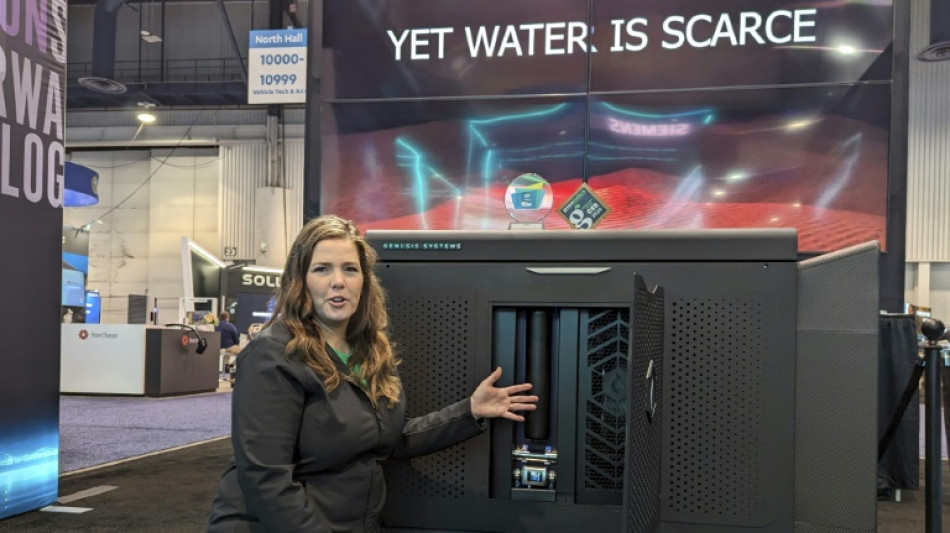

Green tech pumps water from air at CES
Tech aimed at battling climate change and even pumping fresh water out of thin air attracted crowds as the annual CES gadget extravaganza showed its green side.
With calls to fight climate change escalating, technology firms are finding ways to help, according to organizers of the Consumer Electronics Show, which wraps up in Las Vegas on Friday.
Genesis Systems was on the show floor with a first of its kind WaterCube -- about the size of a central air conditioning unit -- that pumps water from the air so effectively it could supply all the water needed by a home.
"Our first mission is to sustainably solve global water scarcity," said David Stuckenberg, who founded Genesis with his wife, Shannon.
"Once you have this plugged into your house...you can turn yourself off (from) the city water."
In places where wells and aquifers have dried up, WaterCube can extract water from the air using its unique process, he explained.
The decision to become a "water entrepreneur" sprang from hearing farmers complain of wells running dry and from serving in the US military in the Middle East as nations there sought new sources of precious water, according to Stuckenberg.
"One of the challenges that we're facing in terms of making humanity sustainable is the stuff we need for life," he told AFP.
"Next to air, water is the most important thing."
Trillions of tons of untapped water are in the air, and one of the effects of a warming planet is more water vapor in the atmosphere, Stuckenberg said.
Water in the air is quickly replenished, creating "an infinite water source" that WaterCube taps into at scale, he explained.
"We're democratizing the water supply," Stuckenberg said.
His Florida-based company is also looking to incorporate carbon-capturing features into WaterCube, since a step in that process already includes drying out the air stream, he said.
- Mussel sea monitors -
Small companies like MolluScan from France were at CES with their own innovative approaches to protecting the environment.
MolluScan wires sea mussels or clams with sensors to detect pollution in waterways or oceans, sharing findings with companies or regulatory authorities -- saving the time and expense of water sampling.
"You are pushing industries to improve the environment," MolluScan co-founder Ludovic Quinault told AFP.
The mollusk-based pollution detectors, known as molluSCAN-eye, have been deployed at the North Pole, Tahiti and elsewhere, according to Quinault.
Companies at CES also touted increased use of recycled or sustainable materials products and power-saving features along with more efficient batteries and solar power generation systems.
French auto equipment supplier Forvia explained how it uses hemp, wood, pineapple and other organic material in its designs.
Meanwhile, Britain-based Matter -- whose backers include Hollywood stars Leonardo DiCaprio and Ashton Kutcher -- debuted filtration technology to catch the harmful flood of miniscule plastic fibers typically released in wastewater from washing machines.
Ambient Photonics, whose early investors included Amazon's Climate Pledge Fund, demonstrated a solar cell capable of charging from indoor lighting, eliminating the need for batteries in devices.
"Connected electronics require ongoing power, which too often derives from disposable or rechargeable batteries," said Photonics chief executive Bates Marshall.
South Korean conglomerate SK Group devoted its exhibit to playfully showcasing how environmentally friendly technologies could bring about a happier future.
Visitors could ride on a train capable of being powered by hydrogen or go for a "magic carpet ride" in a clean energy vehicle guided by artificial intelligence.
The idea is for the influential telecom, chip and energy company to encourage others in the industry to join its mission to be carbon neutral, according to Ah Cho at the SK booth.
L.Bohannon--NG
